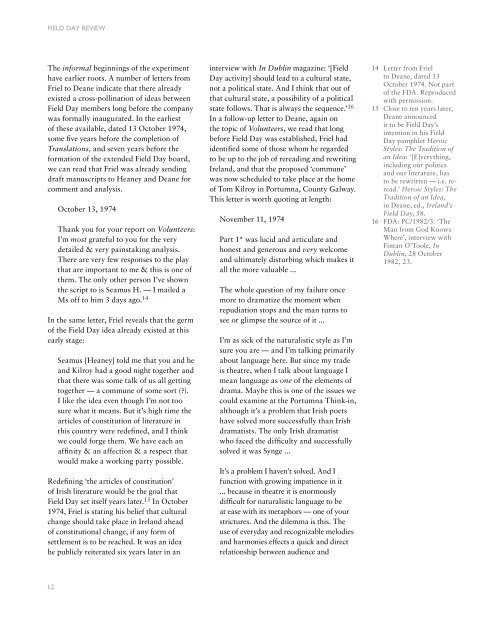cd on translations
cd on translations
cd on translations
You also want an ePaper? Increase the reach of your titles
YUMPU automatically turns print PDFs into web optimized ePapers that Google loves.
FIELD DAY REVIEW<br />
The informal beginnings of the experiment<br />
have earlier roots. A number of letters from<br />
Friel to Deane indicate that there already<br />
existed a cross-pollinati<strong>on</strong> of ideas between<br />
Field Day members l<strong>on</strong>g before the company<br />
was formally inaugurated. In the earliest<br />
of these available, dated 13 October 1974,<br />
some five years before the completi<strong>on</strong> of<br />
Translati<strong>on</strong>s, and seven years before the<br />
formati<strong>on</strong> of the extended Field Day board,<br />
we can read that Friel was already sending<br />
draft manuscripts to Heaney and Deane for<br />
comment and analysis.<br />
October 13, 1974<br />
Thank you for your report <strong>on</strong> Volunteers:<br />
I’m most grateful to you for the very<br />
detailed & very painstaking analysis.<br />
There are very few resp<strong>on</strong>ses to the play<br />
that are important to me & this is <strong>on</strong>e of<br />
them. The <strong>on</strong>ly other pers<strong>on</strong> I’ve shown<br />
the script to is Seamus H. — I mailed a<br />
Ms off to him 3 days ago. 14<br />
In the same letter, Friel reveals that the germ<br />
of the Field Day idea already existed at this<br />
early stage:<br />
Seamus [Heaney] told me that you and he<br />
and Kilroy had a good night together and<br />
that there was some talk of us all getting<br />
together — a commune of some sort (?).<br />
I like the idea even though I’m not too<br />
sure what it means. But it’s high time the<br />
articles of c<strong>on</strong>stituti<strong>on</strong> of literature in<br />
this country were redefined, and I think<br />
we could forge them. We have each an<br />
affinity & an affecti<strong>on</strong> & a respect that<br />
would make a working party possible.<br />
Redefining ‘the articles of c<strong>on</strong>stituti<strong>on</strong>’<br />
of Irish literature would be the goal that<br />
Field Day set itself years later. 15 In October<br />
1974, Friel is stating his belief that cultural<br />
change should take place in Ireland ahead<br />
of c<strong>on</strong>stituti<strong>on</strong>al change, if any form of<br />
settlement is to be reached. It was an idea<br />
he publicly reiterated six years later in an<br />
12<br />
interview with In Dublin magazine: ‘[Field<br />
Day activity] should lead to a cultural state,<br />
not a political state. And I think that out of<br />
that cultural state, a possibility of a political<br />
state follows. That is always the sequence.’ 16<br />
In a follow-up letter to Deane, again <strong>on</strong><br />
the topic of Volunteers, we read that l<strong>on</strong>g<br />
before Field Day was established, Friel had<br />
identified some of those whom he regarded<br />
to be up to the job of rereading and rewriting<br />
Ireland, and that the proposed ‘commune’<br />
was now scheduled to take place at the home<br />
of Tom Kilroy in Portumna, County Galway.<br />
This letter is worth quoting at length:<br />
November 11, 1974<br />
Part 1* was lucid and articulate and<br />
h<strong>on</strong>est and generous and very welcome<br />
and ultimately disturbing which makes it<br />
all the more valuable ...<br />
The whole questi<strong>on</strong> of my failure <strong>on</strong>ce<br />
more to dramatize the moment when<br />
repudiati<strong>on</strong> stops and the man turns to<br />
see or glimpse the source of it ...<br />
I’m as sick of the naturalistic style as I’m<br />
sure you are — and I’m talking primarily<br />
about language here. But since my trade<br />
is theatre, when I talk about language I<br />
mean language as <strong>on</strong>e of the elements of<br />
drama. Maybe this is <strong>on</strong>e of the issues we<br />
could examine at the Portumna Think-in,<br />
although it’s a problem that Irish poets<br />
have solved more successfully than Irish<br />
dramatists. The <strong>on</strong>ly Irish dramatist<br />
who faced the difficulty and successfully<br />
solved it was Synge ...<br />
It’s a problem I haven’t solved. And I<br />
functi<strong>on</strong> with growing impatience in it<br />
... because in theatre it is enormously<br />
difficult for naturalistic language to be<br />
at ease with its metaphors — <strong>on</strong>e of your<br />
strictures. And the dilemma is this. The<br />
use of everyday and recognizable melodies<br />
and harm<strong>on</strong>ies effects a quick and direct<br />
relati<strong>on</strong>ship between audience and<br />
14 Letter from Friel<br />
to Deane, dated 13<br />
October 1974. Not part<br />
of the FDA. Reproduced<br />
with permissi<strong>on</strong>.<br />
15 Close to ten years later,<br />
Deane announced<br />
it to be Field Day’s<br />
intenti<strong>on</strong> in his Field<br />
Day pamphlet Heroic<br />
Styles: The Traditi<strong>on</strong> of<br />
an Idea: ‘[E]verything,<br />
including our politics<br />
and our literature, has<br />
to be rewritten — i.e. reread.’<br />
Heroic Styles: The<br />
Traditi<strong>on</strong> of an Idea,<br />
in Deane, ed., Ireland’s<br />
Field Day, 58.<br />
16 FDA: PC/1982/3. ‘The<br />
Man from God Knows<br />
Where’, interview with<br />
Fintan O’Toole, In<br />
Dublin, 28 October<br />
1982, 23.


